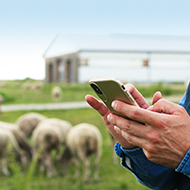
SRUC behavioural scientists develop new method of wellbeing assessment.
Waitrose is trialling a new mobile application, developed by Scotland's Rural College (SRUC), which will help the retailer to assess the wellbeing of animals on its farms.
As the first of its kind, the app is designed to help field teams assessing Waitrose farms better recognise, understand and record 'emotionally expressive' behaviour that contributes to an animal’s quality of life.
According to SRUC, the app is underpinned by extensive scientific research. This has informed a new method of assessing wellbeing called 'Qualitative Behavioural Assessment' (QBA).
Animal welfare inspectors can use the app to record different behaviours in animals which are indicative of their general wellbeing, such as being relaxed, tense, playful or anxious.
This will then help field teams to describe and quantify the different expressions they observe, allowing for a better understanding of the moods the animals are experiencing while interacting with their environment and each other.
Professor Francoise Wemelsfelder from SRUC said: “Good physical health is vital for good welfare but there is clear consensus among the scientific animal welfare community that factors such as enjoyment, contentment and positive excitement play an equally vital role in ensuring that an animal has a good life.
“QBA not only provides a way to assess these factors, it also opens up the conversation about what positive emotional wellbeing for an animal truly looks like. Because we believe fundamentally that animals are not simply production systems to be managed. They are sentient creatures that must be cared for.
“While this remains very much in development, the fact that the app will be trialled and developed at scale with a leading supermarket chain is an incredibly significant and positive step for the industry.”
To learn more, please visit the Waitrose website.



 The veterinary mental health charity Vetlife is inviting the veterinary community to join it for a sponsored cold-water dip.
The veterinary mental health charity Vetlife is inviting the veterinary community to join it for a sponsored cold-water dip.